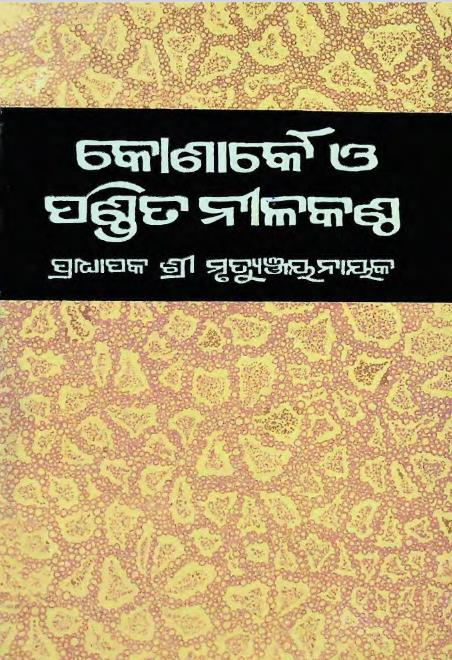In 1964, Mrutyunjay Naik eloquently brought forth the intricate connections between Konark and the eminent figure of Pandit Nilakanth through his insightful essay. This piece not only delves into the historical and cultural significance of Konark but also highlights the intellectual contributions of Nilakanth, thereby weaving a narrative that celebrates Odia heritage.
Pandit Nilakanth, a revered scholar and intellectual of his time, emerged as a bright luminary in the realm of Odia literature and philosophy. He dedicated his life to the study and documentation of ancient texts, traditions, and languages, striving to preserve and promote Odia culture. His profound wisdom and insightful interpretations of spiritual and educational philosophies made him a pivotal figure in Odia history. He was known for his exceptional ability to convey complex ideas in a manner that was accessible to the common person, thus bridging the gap between erudition and everyday understanding.
Nilakanth’s commitment went beyond the mere preservation of knowledge. He believed in nurturing the minds of the younger generation, fostering a sense of identity and pride in Odia culture. His work inspired many to explore their roots and engage with their heritage, making him a beloved figure in educational circles.
The Sun Temple at Konark stands as one of the masterpieces of Indian architecture and art. Built in the 13th century, this UNESCO World Heritage Site symbolizes the zenith of Kalinga architecture. The temple, shaped like a gigantic chariot with twelve wheels, is dedicated to Surya, the Sun God. The exquisite carvings on the stone illustrate various deities, celestial bodies, and intricate scenes of daily life, showcasing the artistic prowess of the artisans of the time.
Konark is not just a monument; it encapsulates the spiritual and cultural ethos of Odisha. The grand narratives of mythology, history, and devotion intricately woven into the fabric of the temple reflect the deep connection between the land and its people. Mrutyunjay Naik, in his essay, draws attention to how Konark stands as a metaphor for the fusion of physical beauty and spiritual essence, making it a pilgrimage site for those seeking enlightenment and inspiration.
Mrutyunjay Naik’s exploration into the relationship between Konark and Pandit Nilakanth underscores the importance of heritage in shaping intellectual thought. Nilakanth, through his scholarly pursuits, echoes the wisdom derived from monuments like Konark, which serve as physical embodiments of the collective consciousness of the Odia people. In his essay, Naik asserts that the legacy of Konark, rooted in faith and artistry, parallels the enlightening journey of scholars like Nilakanth who tirelessly worked to illuminate the path of knowledge.
Naik’s discourse encourages readers to not only appreciate the grandeur of Konark but also to recognize the intellectual battles fought by figures like Nilakanth who sought to revive and uphold the values embedded in their culture. Ultimately, the essay serves as a reminder that the preservation of history and art is as crucial as the pursuit of knowledge, ensuring that the legacy of our ancestors continues to thrive.
In conclusion, Konark o Pandit Nilakanth is more than just an essay; it is a celebration of the synergy between art, culture, and intellect, urging us to honor our past while paving the way for future generations to explore the richness of Odia heritage.
Books Info
| Books name | Konarke o Pandit Nilakanth/କୋଣାର୍କେ ଓ ପଣ୍ଡିତ ନୀଳକଣ୍ଠ |
| Author | Mrutyunjay Naik |
| No Of pages | 99 |
| Publisher | Sahitya Sangraha Prakashana |
| Publication | 2020 |
| Printed At | Lipikara Jhansi Batamangala |
| Distributor | NA |

